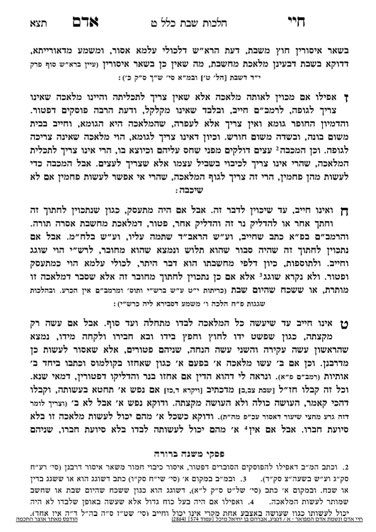We are continuing in siman 8, discussing the concept of misaseik. We left off discussing the practical relevance of the concept of misaseik, and whether it only applies after the fact, after something has been done without intention. One relevance of this concept is the question of whether one must take steps to prevent a situation of misaseik. If misaseik is considered an aveirah, one would be chayav to take steps to prevent themselves from a situation of misaseik. Even if it is not an issur deoraysa, if misaseik is something Chazal instituted should not take place, a person would be chayav to take steps to prevent it from taking place. Others would also be chayav to prevent a person from transgressing it.
In the first perek of Shabbos, the Gemara gives an example of a tailor who tends to keep needles in his garment. The Gemara says that, starting from Friday afternoon, the tailor cannot wear the needles in his garment, in order to avoid him forgetting to remove them before Shabbos. An adornment is not considered carrying, because it enhances the garment or the person, and is therefore tafel to the person/garment. Similarly, the garment is not considered carrying, because it is tafel and batel to the body. The needles, however, do not enhance the garment in any way, but rather, the garment is used to carry the needles, so it is considered carrying, because they are not batel to the garment. Therefore, the tailor must remove the needles. This is true even though he doesn’t realize that they are there, i.e., he is a misaseik.
The Gemara in Bava Kamma says that a case in which a person knew something was in their pocket but then subsequently forgot about it and carried it is a case of misaseik.
Tosfos concludes that misaseik is assur derabanan. Therefore, the tailor should not go out before Shabbos with his needles, but, at the end of the day, should something of that sort happen, it is considered misaseik. Although it is hard to considered misaseik an aveirah miderabanan, since there is no aveirah committed by the person, others will see the person carrying and may think it is muttar to carry or come to make light of the mitzvos. Therefore, one is chayav to take measures to prevent this from happening.
Another of the applications of this question is if the eruv is down and people do not realize it is down. This question falls into the question of misaseik, because the people carrying do not realize they are doing something assur, so it should be akin to the case we discussed yesterday of a person who pulls on something off of the ground thinking it was already detached, only to find out that it had been attached. We will discuss this question further, be’ezras Hashem.
Summary
- One is chayav a korban chatas when they perform an assur action intentionally, but were either unaware it was Shabbos, or they forgot it was assur.
- Misaseik is applied when one is unaware of the action they are performing.
- Misaseik is assur miderabanan, and therefore one is chayav to take steps to prevent a misaseik from occurring.



